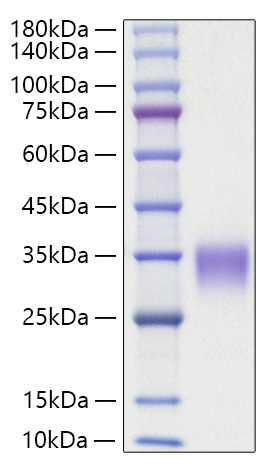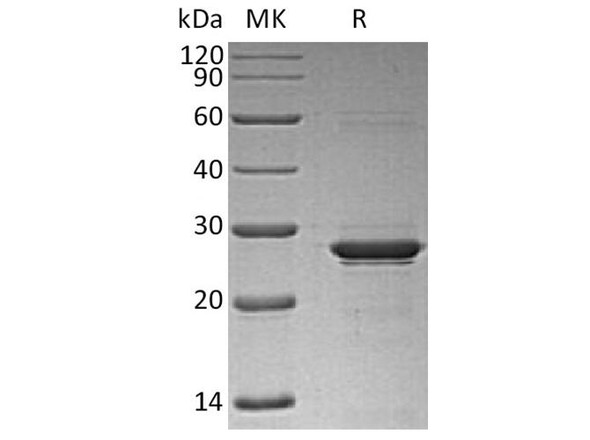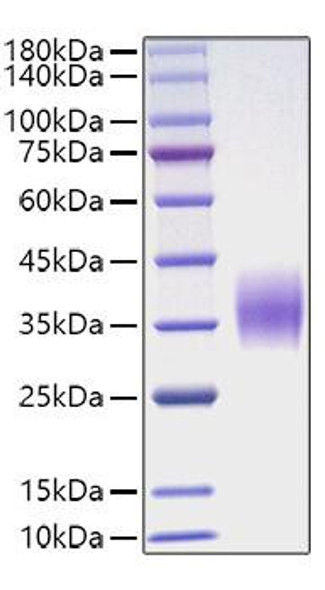Description
Recombinant Rat Oncostatin-M/OSM Protein
The Recombinant Rat Oncostatin-M/OSM Protein is a high-quality recombinant protein produced for advanced research applications in molecular biology and biotechnology. This protein serves as a critical reagent in various experimental contexts, including functional studies, binding assays, and therapeutic development programs, providing researchers with a standardized and reliable tool for investigating protein function and interactions.
This product (SKU: RPCB1280) is produced using HEK293 cells and features a C-His tag for convenient detection and purification. The protein exhibits a calculated molecular weight of 21.57 kDa with an observed molecular weight of 30-36 kDa under denaturing conditions, achieving ≥ 95% as determined by SDS-PAGE., ensuring exceptional quality and consistency for research applications.
Key Features
| High Purity by Affinity Chromatography | |
| Mammalian & Bacterial Expression Systems | |
| High lot-to-lot consistency via strict QC |
| Product Name: | Recombinant Rat Oncostatin-M/OSM Protein |
| SKU: | RPCB1280 |
| Size: | 10 μg , 20 μg , 50 μg , 100 μg |
| Reactivity: | Rat |
| Synonyms: | Oncostatin-M, OSM |
| Tag: | C-His |
| Expression Host: | HEK293 cells |
| Calculated MW: | 21.57 kDa |
| Observed MW: | 30-36 kDa |
| Gene ID: | 289747 |
| Protein Description: | High quality, high purity and low endotoxin recombinant Recombinant Rat Oncostatin-M/OSM Protein (RPCB1280), tested reactivity in HEK293 cells and has been validated in SDS-PAGE.100% guaranteed. |
| Endotoxin: | < 0.1 EU/μg of the protein by LAL method. |
| Purity: | ≥ 95% as determined by SDS-PAGE. |
| Formulation: | Lyophilized from a 0.22 μm filtered solution of PBS, pH 7.4. |
| Reconstitution: | Centrifμge the vial before opening. Reconstitute to a concentration of 0.1-0.5 mg/mL in sterile distilled water. Avoid vortex or vigorously pipetting the protein. For long term storage, it is recommended to add a carrier protein or stablizer (e.g. 0.1% BSA, 5% HSA, 10% FBS or 5% Trehalose), and aliquot the reconstituted protein solution to minimize free-thaw cycles. |
| Storage: | Store at -20℃.Store the lyophilized protein at -20℃ to -80 ℃ up to 1 year from the date of receipt. After reconstitution, the protein solution is stable at -20℃ for 3 months, at 2-8℃ for up to 1 week. |
Oncostatin M is also known as OSM, is a glycoprotein belonging to the interleukin-6 family of cytokines that has functions mainly in cell growth. Of these cytokines it most closely resembles leukemia inhibitory factor (LIF) in both structure and function. However, it is as yet poorly defined and is proving important in liver development, haematopoeisis, inflammation and possibly CNS development. It is also associated with bone formation and destruction. OSM signals through cell surface receptors that contain the protein gp130. The type I receptor is composed of gp130 and LIFR, the type II receptor is composed of gp130 and OSMR. Oncostatin M (OSM) was previoustly identified by its ability to inhibit the growth of cells from melanoma and other solid tumors. It also has been reported that OSM, like LIF, IL-6 and G-CSF, has the ability to inhibit the proliferation of murine M1 myeloid leukemic cells and can induce their differentiation into macrophage-like cells.







